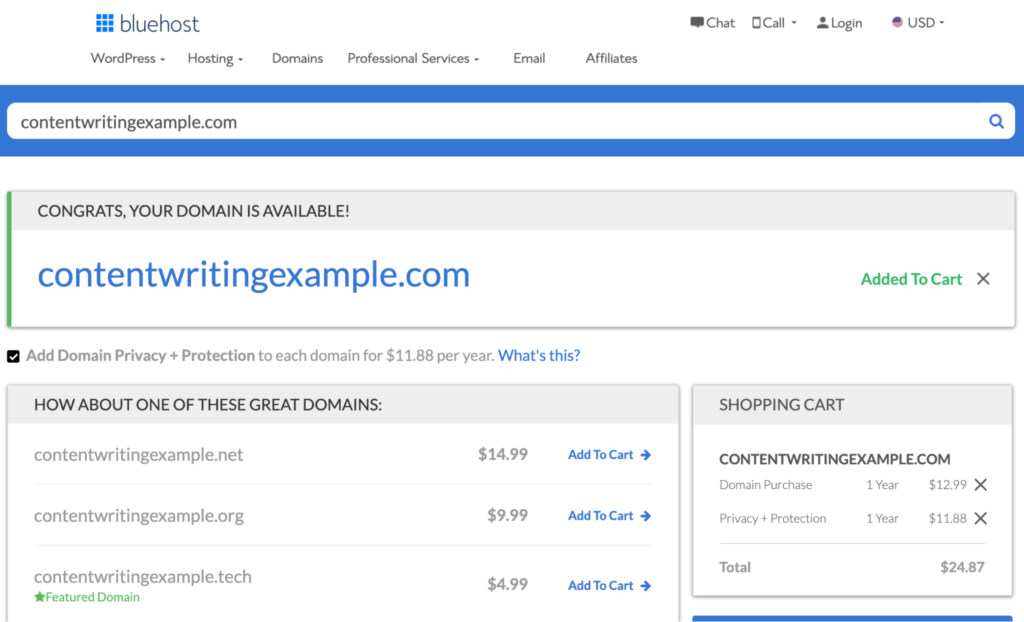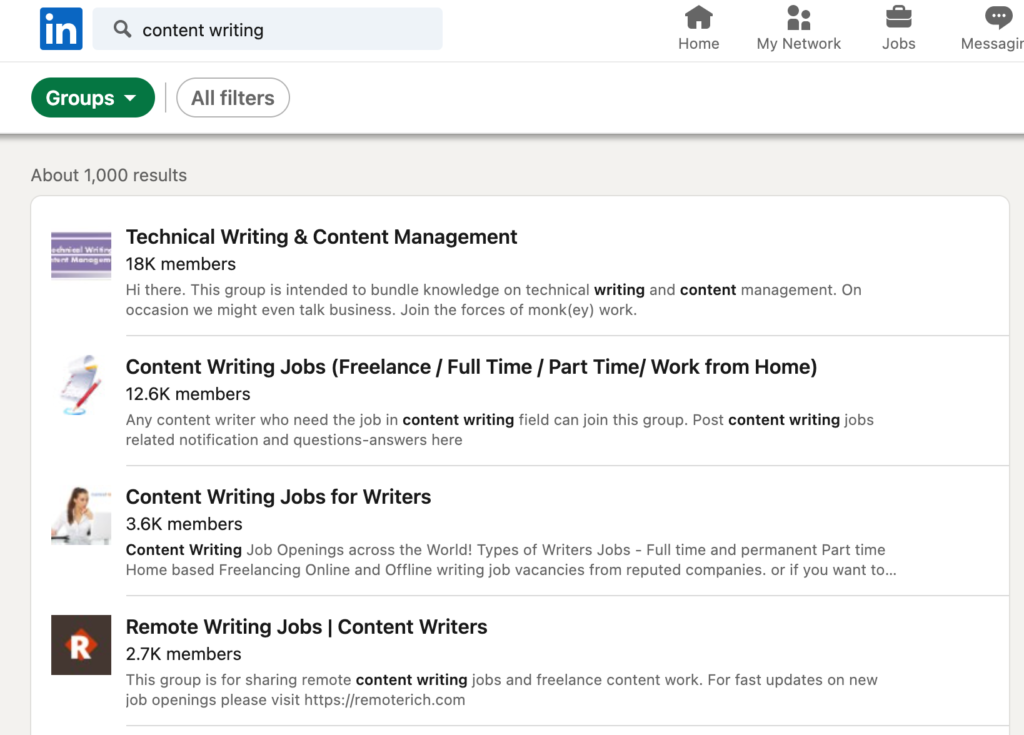Starting a content writing business is a great way to achieve financial freedom with very little investment.
But that also means that it’s an increasingly competitive industry–one that’s hard to establish a new business in.
That’s why understanding how to set up your business the right way, attract high-paying clients, and compete with established agencies is essential to finding success.
Once you start your business, you’ll be able to choose your own income, decide your working hours, and cherry-pick your clients–all from the comfort of your own home.
This guide will cover the steps you need to take to start a content writing business that’s profitable, how to find clients, and how to compete with other agencies.
The Easy Parts of Starting a Content Writing Business
The easiest parts of starting a content writing business are the technical aspects, like setting up your website and social media.
Web hosting companies and website builders can help you set up your website using prebuilt themes and templates. You can have your business site ready to launch within a day, especially if you use a hosting provider like Bluehost.
Bluehost includes both a domain and a WordPress site, plus prebuilt themes that save you from hiring a designer. All you need to do is choose your business name and customize the site with your content.

Writing the content for your business can also be easy, even if you write it yourself instead of hiring writers. There are plenty of tools that can help you with grammar, SEO, and even AI that help produce copy, so you can become a successful writer even without formal training. But if you’re starting a content writing business, you probably have this part covered.
The Difficult Parts of Starting a Content Writing Business
One of the hardest parts of any business is marketing, and a content writing business is no exception.
Content writing is a competitive industry, so finding a unique selling proposition (USP) can be difficult. You’ll have to find a way to stand out from established businesses and convince clients to choose you over cheaper writers.
Another aspect of starting a content writing business that many people struggle with is managing client relationships.
If you’ve never owned a business before, navigating client requests and demands can be difficult. Good writing can be subjective, and you might find clients who don’t know what they want or clients who undervalue you.
You’ll need to learn to think like a business owner, negotiate, and justify your services. You’ll also need to learn how to deal with rejection and criticism, and you may even have to fire clients or employees.
Step 1: Make a Plan
Before you even think about launching your business, there are a few things you’ll need to plan out. This includes creating a business plan, deciding on a niche, and choosing your business model.
Starting any business can be overwhelming, and this is especially true for content writing.
Content writing requires exceptional time management and organization skills, so you need to be crystal clear on all the details while still having time to get organized.
Your ability to market your business also relies on your having a clear plan from the start. You need to know what niche you’ll write in, who your business helps, be able to articulate your value, how much you can afford to spend, and how you’ll run your business day to day.
We have a detailed guide if you want some guidance on what to include in your business plan.
Choose a niche
People want to hire experts, and they’re willing to pay more for them. Niching down makes it easier for you to market yourself, find target clients, and charge higher rates.
When choosing a niche, you want to consider three things:
- What do you have experience in (academically or professionally)?
- What are you passionate about?
- Is it profitable?
Create a list for each of the above categories, and if you find a correlation for all three, that’s a great niche to focus on.
To know whether or not something is profitable, research blogs in that niche. If lots of results come up, that means there’s a lot of interest in content writing in that industry, and it will be easier for you to find clients. Another thing to do when looking at profitability is to look through various job boards for writers in that niche or industry. Are there a lot of postings? What rates are they offering?
If you’re going to hire writers, then prioritize profitability. If you are writing the content yourself, prioritize something you’re passionate about.
Content writing is time-consuming and requires patience and long-term concentration, so if you’re writing about something you hate, you won’t be able to stick with the business long enough to make a good profit.
Decide on a Type of Writing
Once you have an idea of which topics and industries you’ll write on, you can niche down into a TYPE of writing.
You might decide that your business will focus on writing blog posts, whitepapers, website copy, or email marketing copy. There are many different types of writing, and the one you choose will dictate how much you charge.
Whitepaper writing, for instance, is VERY profitable, with many writers earning $7000 per paper. But not all writers want to do that type of in-depth and specific writing.
Here are a few of the most profitable types of writing that you might want to niche into:
- Blog and Article Writing
- Copywriting
- Video Script Writing
- Whitepapers
- Ebooks
- Technical Writing
If you want to hire writers and expand your business quickly, you can cover all these writing styles in one industry and market yourself as the overall expert in your niche. Just be sure to hire writers who specialize in those types of writing because you want to build a reputation for creating high-quality work. You must also pay those high-quality writers fair rates.
Set Your Budget and Goals
Even though starting a content writing business requires very little upfront investment, you should still put together a budget and set financial goals.
How much you’re willing (or able) to invest will dictate whether or not you hire writers and how many, for instance. Or whether you’re able to join a paid job board.
You’ll also need to set goals on how much you need, and want, to be making a month. This will determine how you run your business and which type of clients you’ll pursue.
You’ll find when you start working with clients that not everyone pays in the same way. Some clients will offer to pay on a per-project basis, some pay hourly, and some on a monthly retainer. Some clients pay on a net-30 basis (30 days from receipt of invoice), and others might be paying upfront or upon completion. Your contract with each client will decide when and how you get paid.
Having clear goals in mind will help you decide what you need to quote in these situations to meet your income goals.
Choose Your Business Name
You’ll need to choose a business name so that you can set up your website and market yourself.
You don’t need to choose a complicated name. You’ll want to choose one that is available as a domain and across different social media platforms for consistency.
If you’re starting a business as a solopreneur, you may just want to choose your own name, such as Firstname Lastname Writes. If you are hiring writers and functioning like an agency, consider including a keyword related to your niche in your business name, like CopyHackers or BlogPoint.
You can use Bluehost’s domain checking tool to see if your name is available and then cross-check it on social media accounts like Twitter and Facebook to see if it’s a good fit.

Decide On Your Business Model
Once you’ve decided on a niche and your budget, you’ll need to get clear on how you’ll run your content writing business.
You might want to run your business as a solopreneur, where you do everything yourself, or you might want to work more like an agency and outsource the writing to other writers and focus on marketing your business instead.
Whether you want to work solo or hire writers will be based on whether you’re tight on time or tight on budget.
Hiring writers will save you time and allow you to expand your business faster and take on more clients. Doing the writing yourself will save you the cost of hiring writers (which can often cost more than $1000 per month per writer) but take more of your time.
It is important to note that being a solopreneur does not preclude you from later hiring writers and functioning more like an agency. If you’re tight on money right now and have the skills, start by writing the clients’ projects yourself, and as you make money, you can bring on outsourced writers.
This step also includes setting your prices. Research the market to see what other writers in your niche or industry charge. You don’t want to under or over-price yourself, as you may get taken advantage of or price yourself out of the market.
When setting your rates, start by deciding what you need to be making per year and per month to hit your annual goal. Then you can break it down further to set an hourly rate. Remember, you won’t be able to charge for every hour you work, as some of your work will not be for clients, such as marketing, bookkeeping, and other administrative tasks. You might choose to charge per hour, per project, or monthly. It is up to you and your client.
Step 2: Get Set Up
The next thing you’ll need to do is set up the technical aspects of your business.
This includes creating a website, a portfolio of work, and your social media platforms.
One of the biggest perks of starting a content writing business is that you can do it all virtually. There’s no need to invest in offices or equipment.
But this does mean that your online presence is essential to success–it’s the only way clients will find you, and it’s the only chance you have to make an impression.
Here are some things you’ll need to set up before you launch your content writing business.
Your Website
You need to have a professional website with your own domain if you want clients to take you seriously.
Luckily, there are so many options for web hosting and site builders that it’s really easy and affordable to get set up.
Bluehost is the most popular web hosting company, and you can be up and running within a day. It comes with WordPress included, a free domain, and plenty of website templates to choose from. It also offers a site builder if you want to be more hands-on and 24/7 support if anything goes wrong.
Alongside hosting, Bluehost has also started offering marketing services, like helping you optimize your website for SEO.
Bluehost is also known for being affordable, with plans starting at just $2.95 per month.

Your Portfolio
Before you can start approaching clients, you’ll need some writing samples to show them.
How you go about doing this will depend on whether you’re working as a solopreneur or hiring writers.
If you’re outsourcing, you can ask your writers to give you samples of their work or write test pieces, which you can then show clients.
If you are writing the content yourself, you’ll need three to five writing samples in your niche that you can show to clients to prove you know what you’re doing.
This is where many new content writing businesses struggle–trying to create examples before they’ve actually worked with any clients.
This is when hiring writers can be a good option–they’ll already have portfolios of work, so potential clients know your team is experienced. The other option is simply to look at your niche and write a few samples yourself. For example, if you choose to focus on blog writing in the healthcare industry, write three content pieces on three different healthcare topics. Samples don’t need to be longer than 500-750 words.
If you want live links for your portfolio, consider adding a blog to your site, or guest posting for businesses in your target industry.
Your Social Media
The next thing you’ll need to do is set up your social media accounts so that potential clients can find you.
For most content writing businesses, the best platforms for finding clients are Twitter, Facebook, and LinkedIn. You can also use LinkedIn to find writers for your business. If possible, keep your social media handles consistent across all platforms.
When you set up your social media pages, keep them consistent. You can create a free logo on Canva for your profile picture and banner, and you should use keywords related to your niche in your bio.

Step 3: Organize the Logistics
Once you have a business plan and you’ve set up your website, you can get started on the logistical side of your business, including registering it, hiring writers, and setting up a tax account.
Even if you’re running your business as a solopreneur, it’s worth registering the company to look professional. It will also help you come tax time and taking payment from clients, as some platforms like PayPal require you to keep personal and business accounts separate.
Here are some of the logistical aspects of your business you should organize pre-launch.
Register Your Business
If you want to hire writers and pay taxes as a business, you’ll need to register your business with your state and get a business number and EIN.
As your business is virtual and doesn’t use equipment, it’s unlikely you’ll need a license, but every state is different. Make sure to check your local requirements carefully, and if in doubt, contact a local attorney to find out what you have to do to keep your business legal. You can also choose to become an LLC, which provides personal asset protection.
Once you’ve registered your business, you can apply to have a business tax account. It’s always a good idea to keep your personal expenses separate from your business expenses, even as a sole proprietor.
Draw Up Contracts
You’ll need two types of contracts: one for your writers (if hiring) and one for your clients.
For writers you’re hiring, your contracts should include the payment terms, the scope of work, whether there’s an NDA, and whether they’ll be credited. The contact for your clients will be similar, but make sure you include a clause that protects you against liabilities and theft.
It’s worth working with an attorney or online legal service for this because contracts aren’t something you want to get wrong. For a list of the best online legal services, check out our guide.
Some clients may have their own contracts and NDA’s for you to sign when you work with them. It should go without saying, but NEVER sign anything without reading it in detail first.
Create an Onboarding Document
Having an onboarding document makes sure your client’s first impression is a good one.
It can also help give you structure during your discovery calls with clients and provide your team with consistent outlines.
What you need to include in your onboarding document will vary based on your business model and niche, but some things you may want to have are:
- A brief step-by-step outline for how you’ll approach the project
- A timeline of how long it will take and deadlines/milestones moving forward
- The contract
- Payment terms and invoicing schedule
- Details about their first point of contact
- Any restrictions or rules (e.g., whether or not your answer emails on weekends)
Step 4: Find Clients
Now that you’ve set up your site and registered your business, you can get down to finding your first client.
Because content writing is such a competitive industry, it can be challenging to feel confident enough to approach clients when you first start. It can also be difficult for clients to trust you while your business is new.
Once you get clients, you’ll start to get referrals and new projects through word of mouth. Until then, you should try looking for clients in as many places as possible.
Here are some of the best places to look for clients for your content writing business.
Networking
Networking is a great way to find clients. You’ll make connections that enable you to send warm pitches to editors, business owners, and other writers, which have higher success rates than cold pitching.
You’ll also meet other writers in your industry and stay up to date with trends and startups. You can network in person, or you can join online networking groups to build connections.
Two places that are especially good for this are LinkedIn and Facebook groups.

Social Media
Social media isn’t just a goldmine for marketing–it’s also the perfect place to find clients.
Aside from networking, you can also reach out to clients through direct messages, create posts that add value and show your expertise, and even pay for ads for your business.
Social media also gives you another way to start connecting with clients before pitching them, which will help you build trust with them and improve your chances of success.
Cold Emailing
Cold emailing is another great way to find clients, no matter how much you might hate it.
Although not as successful as warm leads or networking, some businesses reach up to 20% success rates with cold emails. If you are sending cold emails, make sure that your strategy and pitch are well-researched and well-planned.
Check out our guide on crafting cold emails, or consider hiring an email marketer to help you.
Job Boards
While you’re first starting, job boards can be a way to find clients that need content writing.
Job boards tend to be split into two types; paid and free ones.
The paid job boards have better leads and higher quality clients, but you’ll also have a lot of competition from established content writing businesses.
The free ones will have less competition, but you’ll also have to look through a lot of VERY low-paid work to find decent clients.
When searching job boards, try keywords like “freelance,” “remote,” and “anywhere.”
from Quick Sprout https://ift.tt/3o8l1eP
via IFTTT
